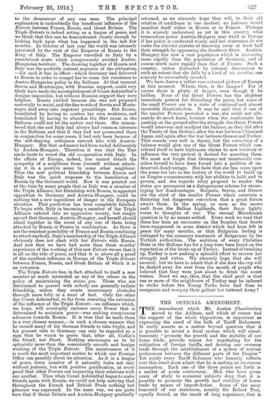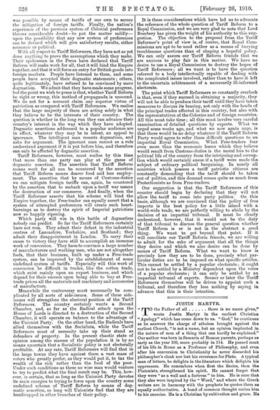THE OFFICIAL AMENDMENT. T HE 'amendment which Mr. Austen Chamberlain moved
to the Address, and which of course had the support of the whole Opposition, is important as expressing the creed of the bulk of Tariff Reformers. It coollY asserts as a matter beyond question that it is possible to invent a fiscal system which will simul- taneously "promote the growth and the stability of our home trade, provide means for negotiating for the mitigation of foreign tariffs, and develop our overseas trade through the establishment of a system of mutual preferences between the different parts of the Empire." Yet surely every Tariff Reformer who honestly reflects over this creed must admit that he is making an enormous assumption. Each one of the three points set forth is a matter of acute controversy. Men who have given years of study to economic subjects deny that it is possible to promote the growth and stability of home trade by means of import-duties. Some of the most honoured of our statesmen, notably Sir Robert Peel, equally denied, as the result of long experience, that it was possible by means of tariffs of our own to secure the mitigation of foreign tariffs. Finally, the nation's experience of the previous system of Colonial preferences throws considerable doubt—to put the matter mildly— upon the possibility that any new system of preferences can be devised which will give satisfactory results, either economic or political.
With all respect to Tariff Reformers, they have not as yet done anything to prove the assumptions which they make. Their spokesmen in the Press have declared that Tariff Reform will make work for all, that it will bind the Empire together, and that it will force an entry for British goods into foreign markets. People have listened to them, and some people have accepted their dogmatic statements ; others, quite legitimately, have refused to be convinced by mere dogmatism. We admit that they have made some progress, but the point we wish to press is that, whether Tariff Reform be right or wrong, this method of propaganda is unsound. We do not for a moment claim any superior virtue of patriotism as compared with Tariff Reformers. We realise that the large majority of them are acting solely in what they believe to be the interests of their country. The question is whether in the long run they can advance their country's interest in the way which they have adopted.
Dogmatic assertions addressed to a popular audience are in effect, whatever they may be in intent, an appeal to ignorance. The intelligent man resents dogmatism, and asks for argument. The ignorant man cannot as a rule understand argument if it is put before him, and therefore can only be affected by dogmatic assertion.
Tariff Reformers, however, must realise by this time that more than one party can play at the game of dogmatic assertion. The assertion that Tariff Reform means work for all can be countered by the assertion that Tariff Reform means dearer food and less employ- ment. The assertion that by means of Customs-duties we can mitigate foreign tariffs can, again, be countered by the assertion that to embark upon a tariff war means the destruction of our commerce. And finally, when the Tariff Reformer asserts that his scheme will bind the Empire together, the Free-trader can equally assert that a system of attempted preferences will create such heart- burnings as to destroy the spirit of Imperial patriotism now so happily ripening. Which party will win in this battle of dogmatism nobody can predict. So far the Tariff Reformers certainly have not won. They admit their defeat in the industrial centres of Lancashire, Yorkshire, and Scotland; they admit their disappointment in London. To carry their cause to victory they have still to accomplish an immense work of conversion. They have to convince a large number of manufacturers and working men, who are not altogether fools, that their business, built up under a Free-trade system, can be improved by the establishment of some undefined system of tariffs. Especially will this work of conversion be difficult in trades, like the cotton trade, which exist mainly upon an export business, and which depend for their success upon being able to buy at Free- trade prices all the materials and machinery and accessories of manufacture.
Meanwhile the controversy must necessarily be com- plicated by all sorts of side-issues. Some of these side- issues will strengthen the electoral position of the Tariff Reformers. The country certainly wants a Second Chamber, and, so far 119 the Radical attack upon the House of Lords is directed to a destruction of the Second Chamber, it will operate on balance to the advantage of the Unionist Party. On the other hand, the Radicals have allied themselves with the Socialists, while the Tariff Reformers must of necessity take up their stand as defenders of property. In the present chaotic state of opinion among the masses of the population it is by no means uncertain that a Socialistic policy is not electorally profitable. At any rate, Tariff Reformers will find that in the large towns they have against them a vast mass of voters who greatly prefer, as they would put it, to tax the wealth of the rich rather than the food of the poor. Under such conditions as these no wise man would venture to try to predict what the final result may be. This, how- ever, is certain, that so long as the Unionist Party devotes its main energies to trying to force upon the country some undefined scheme of Tariff Reform by means of dog- matic assertion, so long will Unionists find that they are handicapped in other branches of their policy. It is these considerations which have led us to advocate the reference of the whole question of Tariff Reform to a Royal Commission, and we are very glad to note that Lord Rosebery has given the weight of his authority to this sug- gestion. The objection to the proposal from the Tariff Reformer's point of view is, of course, that Royal Com- missions are apt to be used rather as a means of burying troublesome questions than of shaping a hopeful policy. We can only assure our Tariff Reform friends that we are anxious to play fair in this matter. We have no desire to use a Royal Commission to destroy the hopes of Tariff Reformers • all we want is to have the question referred to a boy intellectually capable of dealing with the complicated issues involved, rather than to have it left to the uncertain arbitrament of a necessarily ill-informed electorate.
The point which Tariff Reformers so constantly overlook is that, even if they succeed in obtaining a majority, they will not be able to produce their tariff until they have taken measures to discuss its bearing, not only with the heads of the principal trades affected in this country, but also with the representatives of the Colonies and of foreign countries. All this must take time ; all this must involve very careful examination of detailed questions by experts. What we urged some weeks ago, and what we now again urge, is that there would be no delay whatever if the Tariff Reform Party would agree to refer these difficult questions to an impartial Royal Commission. What Free-traders fear even more than the economic losses which they believe would result from Customs-duties is the moral loss to the political life of the country from the intriguing and corrup- tion which would certainly ensue if a tariff were made the subject of ordinary political bargaining. In nearly all countries which possess a tariff patriotic citizens are constantly demanding that the tariff should be taken out of politics, and this demand comes quite as much from Protectionists as from Free-traders.
Our suggestion is that the Tariff Reformers of this country should begin by declaring that they will not allow the tariff to come into party politics. On this basis, although we are convinced that the policy of free imports is the best policy for a little island with a. world-wide trade, we are perfectly willing to abide by the decision of an impartial tribunal. It must be clearly understood, however, that it would not be the duty of that tribunal to discuss the general question whether Tariff Reform is or is not in the abstract a good thing. We want to get beyond that point. If it will conciliate our Tariff Reform friends, we are willing to admit for the sake of argument that all the things they desire and which we also desire can be done by means of Tariff Reform. What we want to know is precisely how they are to be done, precisely what par- ticular duties are to be imposed on what specific articles. This cannot be settled by a popular electorate ; it ought not to be settled by a Ministry dependent upon the votes of a popular electorate ; it can only be settled by an impartial tribunal of experts. Sooner or later the Tariff Reformers themselves will be driven to appoint such a tribunal, and therefore they lose nothing by saying in advance that this is their intention.











































 Previous page
Previous page